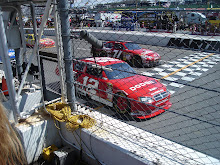NFL insiders considered defensive tackle Albert Haynesworth the biggest catch of the NFL free agency season, and the Washington Redskins reeled him in Friday morning, signing the former Tennessee Titans standout to a massive contract.
How massive? ESPN's John Clayton says the deal is for seven years and $100 million, though with incentives it could be closer to $115 million. There are reportedly about $41 million in guarantees and over the first 13 months of the deal, Haynesworth is expected to make roughly $32 million.
This after giving corner DeAngelo Hall $54 million over six years -- $22.5 million of which is guaranteed. Think the Redskins are hoping 2010 comes without a salary cap?
(NOTE: As I wrote this, the Redskins released corner Shawn Springs, saving $6 million toward the salary cap. The team also recently restructured the contracts of offensive tackle Chris Samuels and defensive lineman Cornelius Griffin -- and last week they released linebacker Marcus Washington.)
Haynesworth, who led the Titans last season with a career-high 8 1/2 sacks, also had 75 tackles, 22 quarterback pressures, seven tackles for a loss and forced four fumbles. Once known as the guy who stomped on Andre Gourad's head a few years ago, Haynesworth had developed into a dominating presence on the defensive line.
But how will he play out in Washington, a place many a free agent has gone in recent years to see their careers flounder? I'm looking at you, Adam Archuleta and Deion Sanders.
On the one hand, the deal makes a lot of sense for Washington; the Redskins need help on the offensive and defensive lines, and Haynesworth, if he produces even a fraction of what he did a year ago, would provide just that. It could also spell the end of the line for Jason Taylor, who was due to receive $8 million from the Redskins this season.
Taylor's performance suffered in 2008, though that was more because defensive coordinator Greg Blache moved him from the left end where he made a career to the right side. Adjusting to a new position, and injuries, kept Taylor from being productive and unless he restructures his deal, I think the Haynesworth signing singals the end for Taylor in D.C.
There are other issues to consider with Haynesworth. He's missed 22 of 112 career games due to injury. Some have questioned his mindset. Was Haynesworth's 2008 season a product of knowing he was about to be a free agent? Did he play out of his mind just to get a big payday, only to somewhat shut it down after signing on the dotted line?
And though Haynesworth hasn't caused problems since returning from suspension after stomping on Gourad's head, he's shown on occasion to be a bit of a hothead. Is that the sort of mindset the Redskins need? If Haynesworth can produce the way he did in 2008, and give Washington the pass rush it sorely missed last season, it might not matter.
Still, $100 million is a lot of money to commit to someone with just one dominant season. If Haynesworth had been this dominant for three or four consecutive seasons, the signing wouldn't bother me so much. But Haynesworth hasn't done that, and I can't help but wonder if this is going be yet another signing in Washington that looks great in February and March, only to look like a colossal waste come October.
I hope Haynesworth proves me wrong; really, I do. But I'll have to see it before I believe it.
A Brutal, Devastating Reminder
14 years ago

